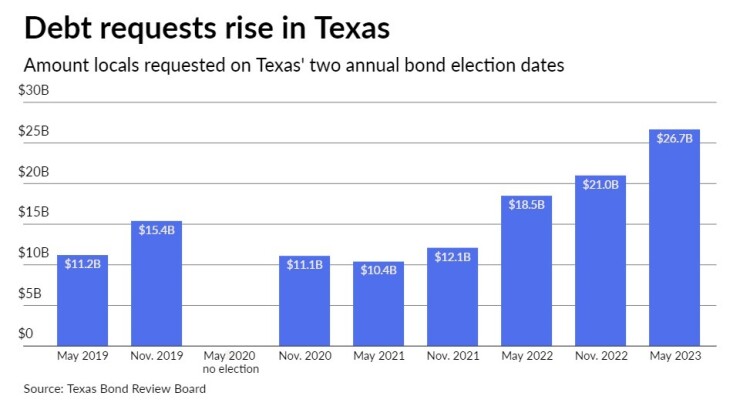Texas voters will decide the fate of 246 bond propositions totaling $26.67 billion on Saturday as the amount of debt on ballots continues a climb driven by public school district construction projects.
Schools account for 92.5% of the property tax-backed debt in the upcoming election, according to Texas Bond Review Board data.
Their new proposals come after voters approved nearly $23 billion of school bonds in last year's May and November elections, causing a stampede of bond sales that dramatically drained the capacity of a state bond guarantee program that lowers interest costs.

"It's a combination of new school buildings for growth in certain areas of the state, upgrades for safety and security, and the other thing we're hearing is a just a really sharp increase in costs because of inflation in the construction industry," said Amanda Brownson, associate executive director of policy and research at the Texas Association of School Business Officials.
Texas public schools added 91,000 students in the current school year, up from 56,000 the previous year, she said.
Fast-growing Northwest Independent School District in the Dallas-Fort Worth area has the most bonds on the ballot at nearly $2 billion in three proposals. The bulk of the request — a $1.67 billion measure would fund eight new or replacement schools and four early childhood centers to accommodate an additional 8,400 students. The district's enrollment has climbed to 29,248 this year from 17,752 in 2013. New sports stadiums would be financed with $301.5 million of bonds in a separate measure.
Brownson said districts also need to fund projects to comply with proposed Texas Education Agency school building
Safety and security projects totaling $30.5 million are part of Denton ISD's three-part $1.4 billion bond election without a tax hike. The district in the north Dallas-Fort Worth region would fund improvements to school vestibules, and install loud-noise detecting sensors and automatic door locking systems.
Rising construction costs were cited by the Houston area's Fort Bend ISD, which warned it will likely be back on the November ballot with an even larger bond request if voters reject its three-part, $1.26 billion bond package mainly for school construction and to remedy "critical" conditions at existing schools.
"If all the same projects are on that bond, the cost of the bond will increase by $50 million due to a projected 8% inflation rate for construction," Fort Bend said on its website. "A further postponement to May 2024 could add as much as $100 million of construction inflation."
Texas bond elections are restricted to May and November dates and issuers must list separate bond issues for specific uses.
The state legislature is considering
The House's plan for a massive property tax cut by
Garland ISD in the Dallas area has nearly $1.28 billion of bonds in three propositions to address more than $3 billion in needed repairs and upgrades and update technology. Crowley ISD is hitting the ballot for the first time since 2007 with a three-part, $1.17 billion bond package to build seven schools and other facilities and improve security.
Dripping Springs ISD west of Austin is back on the ballot with $223.7 million of bonds after voters in November rejected $481 million of new debt. The pared-down proposition eliminates construction costs for a high school and technology equipment.

With three of its campuses already over capacity and overall enrollment projected to exceed district-wide capacity of 8,850 students in the 2026-27 school year, the district said another defeat at the ballot box would likely lead to changes in attendance boundaries, class sizes, and the use of portable classrooms.
Another factor that could be spurring district debt propositions this month is the dwindling capacity in the Texas Permanent School Fund's triple-A-rated bond guarantee program in the wake of last year's successful elections.
"I do think you can see all those districts looking at each other and saying 'I want to jump in line before you get in line,'" Brownson said.
The fund's dwindling capacity
Projected available capacity under the program's $117.32 billion cap set by the Internal Revenue Service fell as low as $26.6 million at the end of 2022, but rebounded after the State Board of Education lowered
Nicole Conley, a managing director at Siebert Williams Shank & Co., told The Bond Buyer's Texas Public Finance Conference in April the capacity increase "is a drop in the bucket" given the large amount of school bonds on May ballots.
"My thinking is the non-PSF is probably going to be here to stay," she said, noting
Austin ISD Chief Financial Officer Eduardo Ramos, who also spoke at the conference, said being denied the PSF guarantee impacted the district's $542 million January bond sale despite its triple-A ratings from Moody's Investors Service and Kroll Bond Rating Agency. The deal's true interest cost of 3.67% was 10 basis points higher than a $551 million Dallas ISD bond issue with the PSF guarantee that priced the same day, he said.
The largest amount of city bonds in the upcoming election comes from Frisco, which has five propositions totaling $473.4 million. The city of 210,700 north of Dallas would spend the proceeds on public safety facilities and equipment, street construction, government service facilities, parks, and a parking garage.
A five-part, $278 million bond package is on tap in Arlington to fund streets, bridges, storm drainage, and parks, as well as public safety, city administration, and library facilities. Round Rock north of Austin has a two-part $274 million bond proposal for parks and recreation and public safety facilities.
Pearland has four propositions totaling $181.3 million on the ballot to fund drainage, street, bridge, and sidewalk improvements, as well as for parks and a fire station. The city of 125,990 south of Houston
Voters in McKinney will decide whether to issue $200 million of bonds to accommodate commercial airline service at the city's general aviation airport, currently used by corporations and privately owned aircraft. The plan envisions a 144,000 square foot terminal with four passenger gates. The city is in the Dallas region, which is already served by two major commercial facilities, Dallas Fort Worth International Airport and Love Field.





